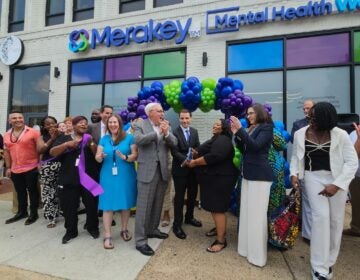Delaware readies coordinated effort to fight addiction, improve mental health care
Gov. Carney: “We know there’s a huge cost. There’s no price you can put on the loss of a loved one. And that motivation needs to be with us as we implement this action plan.”
Gov. John Carney has asked the General Assembly to make room for additional funds in the next budget year to enact recommendations to combat addiction and improve treatment for mental illness.
The recommendations are outlined in a three-year action plan released by the Behavioral Health Consortium on Tuesday.
“You can’t go any place in the state of Delaware without hearing people talk about mental health issues that are challenges in individual communities, and, in particular, the opioid crisis that afflicts families and communities across our state,” Carney said at a press conference.
“We know there’s a huge cost. There’s no price you can put on the loss of a loved one. And that’s the motivation that needs to be with us as we implement this action plan,” he said.
Chaired by Lt. Gov. Bethany Hall Long, the consortium was a recommendation of Carney’s Action Plan for Delaware to address the opioid crisis in the state — where 345 people dies of overdoses last year. The group consists of health officials, law enforcement, state leaders and advocates.
For six months, consortium members have met with more than 600 Delawareans to hear personal stories about how the addiction epidemic has affected them, and to gather feedback on improving the behavioral health care system.
“As we listened, all our hearts were heavy from the problems with access, to individual suffering,” Hall Long said. “I think about the families and mothers who came forward. Seaford, 3 a.m., child with a mental health crisis, didn’t know where to go. Even though we have Help is Here, we have hotlines, people are traumatized. The grandmother here in Wilmington who pleaded for help for her child who had a substance abuse disorder and she was now raising the 3-year-old and had family cycle of prison re-entry.”
The report addresses short-and-long-term recommendations to end stigma, improve access and treatment, corrections and law enforcement, data and policy, education and prevention and family and community readiness. After collecting 1,100 recommendations, the consortium prioritized 117 key plans of action.
Recommendations include expanded detox beds, residential centers, outpatient treatment and sober living centers. The state also wants to be the first in the nation to implement an overdose system of care.
Other plans of action include criminal justice diversion programs that help individuals receive mental health treatment— as 82 percent of inmates suffer from a mental health or substance abuse disorder.
“As we listened to residents and brainstormed problems, they were our family. They are our family. They’re Delawareans,” Hall Long said. “This cuts across our school setting, this affects our workplace, we have a lot of businesses invested in this issue, it affects our economy, and our faith based community.”
WHYY is your source for fact-based, in-depth journalism and information. As a nonprofit organization, we rely on financial support from readers like you. Please give today.





